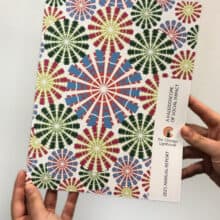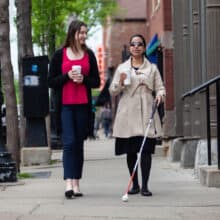Commentary: On Being Raised by Blind Parents
June 7, 2016
Last month, we highlighted the topic of parenting in honor of Mother’s Day. The Lighthouse’s very own Dawn Hale shared her experience about being a parent with a visual impairment, and I had the honor of interviewing my mom, who spoke about her experience raising a child who is blind. In the June 1st edition of The New York Times, photographer David Snider published a moving photographic project, where he captures the lives of his parents who happen to be blind. Snider hopes to spread more awareness about the lives and capabilities of people with vision loss with this project.
The majority of society still has negative stereotypes about blindness, and these are only multiplied when parenthood comes into the equation. I remember several years ago hearing on the news about a newborn who had been removed from his parents at the hospital simply because they were both blind. This happened here in the United States, where legislation like the ADA prohibits discrimination against people with disabilities. Fortunately, after many advocacy efforts, the baby was returned to his parents.
Although I am not a parent, stories like this one infuriate me, and are still all too common. I personally know many couples who happen to be blind or visually impaired, and are excellent parents. Still, well meaning friends and family sometimes do or say things that reflect the outdated and negative attitudes about blindness. Probably the most common of these stereotypes is that the children are responsible for taking care of their parents and even the household. People assume that because both parents have no sight, the entire responsibility falls on their children’s shoulders.
As David Snider shows us in his photographs, nothing could be further from the truth. His project gives viewers a glimpse into the lives of his parents, and how they were more alike than different. From maintaining the household to holding professional jobs, his parents were perfectly capable of doing just about everything their sighted counterparts did. David also highlights some of the subtle differences that existed in his family. He and his younger sister would help out with small tasks, like reading the mail or guiding their parents when out in public. All of these aspects of his family made David Snider more aware about the challenges faced by people who are blind or otherwise disabled.
I can only imagine how my blindness opened my family’s eyes to things they had previously overlooked, such as accessibility barriers. This, I’m sure, is also what happened in David Snider’s case. According to David, this is the first time a photograph project has been done about parents who are blind and how they go about their lives. Kudos to him for this unique project, which I hope will open the eyes of the general public, and show them that parents who are sighted and those who are blind or visually impaired are more alike than different. It is often said that parenting is one of the most difficult – and rewarding – things to do, and this is true for anyone regardless of abilities or disabilities.





